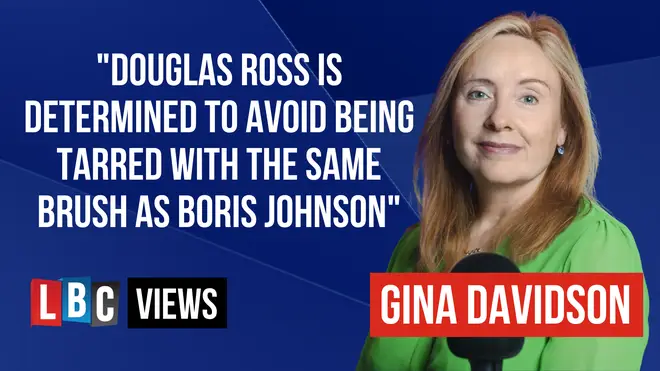
Clive Bull 1am - 4am
14 January 2022, 08:38

Why can’t the Scottish Tories be more like the English ones?
It’s a refrain being asked since the Scottish Conservative leader Douglas Ross went out on a limb and called for the resignation of Boris Johnson, after he admitted attending the Downing St garden party on May 20, 2020 - even if it was just for 25 minutes.
Why would Ross - and his 30-strong group of Conservative MSPs - demand that the Prime Minister go before the results of the Sue Gray inquiry are even published? Surely a more cautious-approach, such as that being adopted by many English Tory MPs, is the right one? Keeps all options open after all.
Well that is not to understand the Scottish Conservative and Unionist Party, the character of Douglas Ross, or Scottish politics in the era of devolution.
The Scottish Tory party is an autonomous organisation in the sense that it elects its own leader, it’s own candidates for elections, and writes its own policies. Of course these tend to align with those of the UK Conservative party, although there have in recent times been major divisions even there, Brexit being a case in point. However Tory MPs representing Scottish constituencies in the Commons are part and parcel of the UK party - they sit on the government benches and vote as the whips tell them to. That includes Douglas Ross of course.
However, he is a man who has determined to avoid being tarred with the same brush as Boris Johnson and who perhaps has sharper political instincts than many give him credit for. While he may have backed Johnson to be Tory leader over Jeremy Hunt, he has grown increasingly uncomfortable with what some might describe as the lack of moral fibre on show by No10 through the pandemic.
While he will credit Boris Johnson with the success of the Covid vaccine programme, when it comes to breaking the law, there he draws a very unequivocal line. It might be the football referee in him, or the fact his wife is a serving police officer, but he resigned from Johnson’s government as a junior minister in the Scotland Office after Dominic Cummings' trip to Barnard Castle. At the time he said Mr Cummings' "intentions may have been well-meaning" - but that he could not tell constituents who had been unable to visit sick relatives during lockdown that "they were all wrong and one senior adviser to the government was right".
It was for similar reasons he was also quick to express his anger when the photos of Christmas parties in Downing Street began to surface late last year. The email which surfaced showing 100 people were invited to enjoy the lovely weather in the Downing St garden on May 20 2020, and the Prime Minister’s admission that he was there, was the last straw for the Moray MP.
Of course while his supporters will say this takes courage, or shows moral backbone, there is some political expediency at play. Council elections are being held in May and after putting on an extra 100,000 votes at the Holyrood elections last year, Ross would have hoped for a good showing this year. Boris Johnson’s actions will have been seen to be putting that in jeopardy.
It’s also incredibly difficult for leaders of both Scottish Tory and Scottish Labour parties to face Nicola Sturgeon every week if their UK party leaders have done something which they will be crucified for yet bear no actual responsibility. That too will have been weighing heavily on Ross’s shoulders. No-one wants to be considered head of a branch office.
Scottish devolution too has pushed UK-wide parties into adapting. The Scottish Parliament has made Westminster a lesser concern to many voters, particularly on day-to-day issues, and the pandemic and Nicola Sturgeon’s daily television briefings at its height, have underlined that for many Scots - those who are not particularly consumed by the constitutional question. A compare and contrast between Boris Johnson and Nicola Sturgeon does not end well in the minds of many voters, even those who are not necessarily SNP supporters.
But if there’s one obvious gaping chasm between the Scottish Tories and the English Tories, it’s those dismissive, belittling “lightweight” comments by Jacob Rees-Mogg about Douglas Ross. It is hard to think that even in the rough and tumble of Scottish politics that an MSP would refer to someone in their own party in such a manner - even when at loggerheads. As one Tory MSP said, if there’s an archetypal Tory toff who as a Scottish Conservative you don’t want to be associated with, then Rees-Mogg is right at the top of that list.”
Scottish Tories, it would seem, are at least politer.